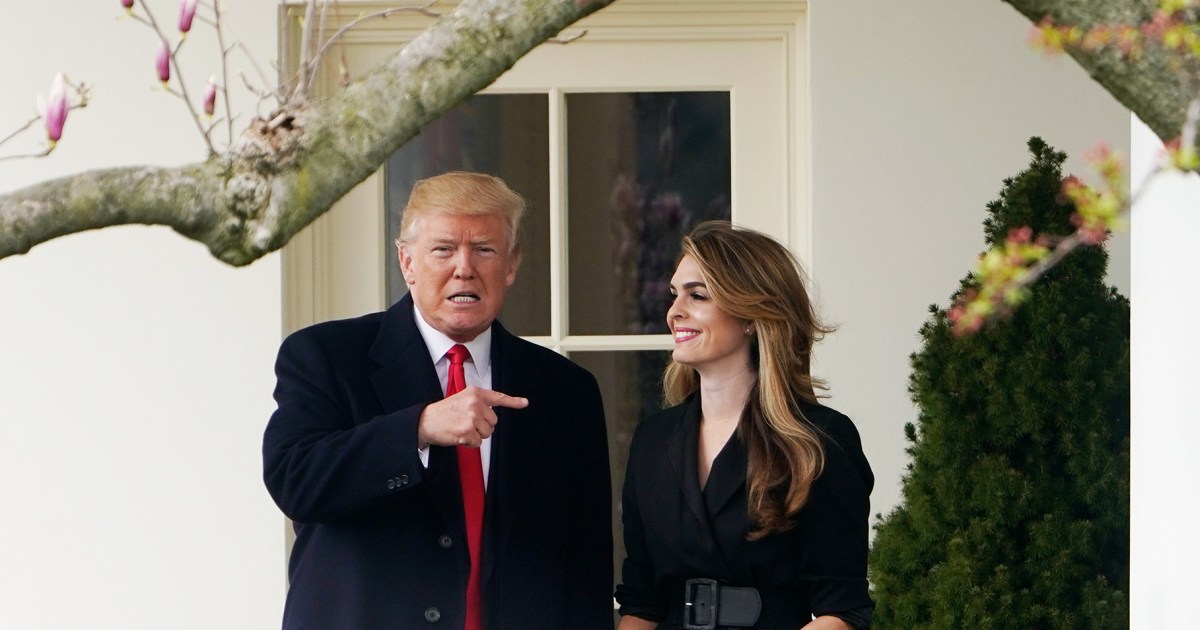Hope Hicks’ Trump trial testimony confirms a depressing, regretful reality

United States
Breaking News:
Washington DC
Sunday, May 19, 2024


At the heart of Donald Trump’s former campaign press secretary and onetime White House communications director Hope Hicks’ Friday testimony in the hush money trial was a moment burned into the collective conscience of all Americans: The infamous “Access Hollywood” tape, and the warnings we learned about the man who was about to become president.
Hicks’ testimony should be a moment of painful reflection not just on her as an individual, but also on the shirked responsibility of so many who chose to disregard evidence of what Trump promised.
Hicks did two stints in the Trump White House; one from 2017 to 2018, and then two years later, in 2020. Unlike many figures who worked in the Trump orbit, she made it out of Trumpworld relatively unscathed. She managed to not have her reputation completely ruined by her former boss, a stark contrast to other former Trump employees like Rudy Giuliani, Peter Navarro, Paul Manafort, Rick Gates, Michael Cohen and Roger Stone. Like National Enquirer owner and Trump friend David Pecker, Hicks is a good witness; she hasn’t spoken to the media, still feels warmly about the guy and hasn’t authored a book about Trump called “Revenge.”
And while her three-hour testimony was comparatively short, it was damaging for Trump’s defense, according to analysis from the likes of MSNBC legal analyst Andrew Weissman.
Though it was clear that Hicks is still intensely loyal to her former boss, her testimony was able to thread the needle for the prosecution.
Hicks mostly focused on the fallout from the Oct. 7, 2016, “Access Hollywood” tape, in which Trump showed what many concede now are his true colors: the gleeful boasting of a person who wields power and privilege with little to no regard for the well-being, safety or autonomy of others.
The prosecution’s thesis is that a panicked Trumpworld was trying to suppress Trump’s former paramours Karen McDougall and Stormy Daniels’ stories because they knew these two stories could be the death knell for Trump’s presidential campaign should they surface mere weeks before Americans headed to the polls.
Hicks’ testimony about the “Access Hollywood” tape confirms a grim reality: People voted for the man who bragged about sexual assault because they couldn’t face voting for a woman. The revelation should have sunk his campaign then and there. Looking back, it’s hard to imagine that it didn’t. But he prevailed. Perhaps he wouldn’t have, had McDougal and Daniels been able to share their stories. And perhaps Roe v. Wade would still be the law of the land, had those stories been shared and not caught and killed.
But those are hypotheticals. What is tangible is that Hicks was, like so many other members of Trumpworld, deeply focused on delivering for her boss and not bothered by the ethical and moral implications of her acts. Therefor Hicks’ testimony should be a moment of painful reflection not just on her as an individual, but also on the shirked responsibility of so many who chose to disregard evidence of what Trump promised.
“He wanted to make sure that there was a denial of any kind of relationship,” said Hicks while testifying, who was at that time Trump’s campaign press secretary. Hicks recounted how, after receiving an email from David Fahrenthold, the Washington Post reporter who broke the “Access Hollywood” story, with the headline “URGENT WashPost query,” she sent an email to other members of the campaign — Jason Miller, David Bossie, Kellyanne Conway and Steve Bannon — who said “deny, deny, deny.” Hicks testified, “It was a reflex,” and said she was “a little shocked.”
Prosecutor Matthew Colangelo asked Hicks, “Is it fair to say that, during this period, Mr. Trump was concerned these reports could hurt his standing with voters?”
Hicks replied, “Yes.”
Trump’s motivation being his presidential campaign is what makes the hush money payments campaign such a strong case. Her testimony alleges that Trump’s motivation was the presidency and not, say, protecting his third wife or his fifth child, who at the time was small.
This conservative Supreme Court might not exist if one person in Trumpworld had done the moral thing and come forward before the election. But none of them did.
“I hope we don’t ruin Hope,” The Washington Post reported Donald Trump Jr. saying right after Trump senior won the White House. As Hicks wept on the stand, one had to wonder if Trumpworld had finally done just that.
There’s been a lot of back-and-forth about why Hope Hicks cried on the stand, and we can’t know the reason for sure. On the stand, Hicks made it clear that Trump was killing these stories because he wanted to win the presidency, that Trump was single-minded about that.
And now, women in many red states are forced to bleed out in parking lots because they’re not “sick enough” to treat. This conservative Supreme Court might not exist if one person in Trumpworld had done the moral thing and come forward before the election. But none of them did — maybe because they were ideologically blinded. Or maybe because they just wanted to deliver for their guy.